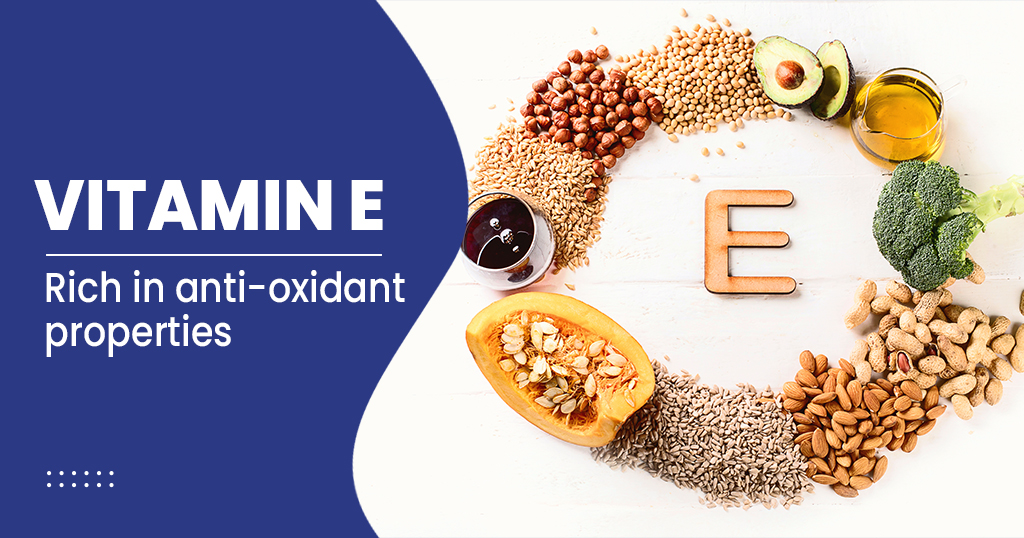Welcome to Wellhealthorganic.com, your trusted source for holistic wellness information. Today, we’re diving deep into the world of Vitamin E, exploring its numerous health benefits and highlighting the best nutritional sources to incorporate into your diet. Join us as we uncover the secrets of this essential nutrient and its role in promoting overall health and well-being.
Understanding Vitamin E:
Vitamin E is a fat-soluble nutrient that acts as a powerful antioxidant in the body. It plays a crucial role in protecting cells from damage caused by free radicals, which are unstable molecules that can contribute to various chronic diseases and premature aging. In addition to its antioxidant properties, Vitamin E also supports immune function, skin health, and cardiovascular health, making it an essential nutrient for overall wellness.
Health Benefits of Vitamin E:
- Antioxidant Protection: One of the primary roles of Vitamin E is its ability to neutralize free radicals and protect cells from oxidative damage. By reducing oxidative stress in the body, Vitamin E helps lower the risk of chronic diseases such as heart disease, cancer, and Alzheimer’s disease.
- Heart Health: Vitamin E may help maintain heart health by preventing the oxidation of LDL cholesterol, commonly referred to as “bad” cholesterol. By inhibiting the oxidation of LDL cholesterol, Vitamin E reduces the risk of plaque buildup in the arteries and lowers the risk of heart disease and stroke.
- Immune Support: Vitamin E plays a vital role in supporting immune function by enhancing the production of immune cells and promoting their proper function. By bolstering the immune system, Vitamin E helps the body defend against infections and illnesses.
- Skin Health: Vitamin E is often praised for its skin-nourishing properties. As an antioxidant, Vitamin E helps protect the skin from damage caused by UV radiation, pollution, and other environmental stressors. It also promotes skin repair and regeneration, helping to maintain a youthful complexion and prevent premature aging.
- Eye Health: Vitamin E may play a role in maintaining eye health and preventing age-related eye diseases such as macular degeneration and cataracts. As an antioxidant, Vitamin E helps protect the delicate tissues of the eyes from oxidative damage and inflammation.
Nutritional Sources of Vitamin E:
Now that we’ve explored the health benefits of Vitamin E, let’s take a look at some of the best dietary sources of this essential nutrient:
- Nuts and Seeds: Nuts and seeds are excellent sources of Vitamin E, particularly almonds, sunflower seeds, and hazelnuts. Just a handful of these nutrient-packed snacks can provide a significant portion of your daily Vitamin E needs.
- Vegetable Oils: Vegetable oils such as sunflower oil, safflower oil, and wheat germ oil are rich sources of Vitamin E. Use these oils in cooking or salad dressings to boost your Vitamin E intake.
- Green Leafy Vegetables: Dark green leafy vegetables like spinach, kale, and Swiss chard are packed with Vitamin E, along with other essential nutrients. Incorporate these nutrient-rich greens into your meals to support overall health and well-being.
- Avocado: Avocado is not only delicious but also a great source of Vitamin E. Add sliced avocado to salads, sandwiches, or smoothies to increase your Vitamin E intake and enjoy its numerous health benefits.
- Fortified Foods: Some foods, such as breakfast cereals, may be fortified with Vitamin E to enhance their nutritional content. Check the labels of packaged foods to see if they contain added Vitamin E.
Incorporating Vitamin E Into Your Diet:
Now that you know the health benefits and nutritional sources of Vitamin E, it’s time to start incorporating this essential nutrient into your diet. Here are some simple tips to help you boost your Vitamin E intake:
- Snack on Nuts and Seeds: Keep a stash of nuts and seeds on hand for a quick and nutritious snack. Almonds, sunflower seeds, and pumpkin seeds are all excellent choices high in Vitamin E.
- Cook with Vegetable Oils: Use vegetable oils like sunflower oil, safflower oil, or olive oil in your cooking to add flavor and increase your Vitamin E intake.
- Load Up on Leafy Greens: Make leafy greens a staple in your diet by incorporating them into salads, soups, stir-fries, and smoothies. Spinach, kale, and Swiss chard are all rich sources of Vitamin E.
- Enjoy Avocado: Add sliced avocado to your meals or snacks for a creamy, nutrient-packed boost of Vitamin E.
- Choose Fortified Foods: Look for fortified foods like breakfast cereals that contain added Vitamin E to help meet your daily nutritional needs.
The Bounty of Vitamin E in Food
- Sunflower Seeds: (Per 100 grams = 35.17 mg) Enjoy roasted and salted sunflower seeds as a snack or incorporate them into cakes and cookies while baking. You can also add them to yogurt, salads, parfait, and oatmeal.
- Almonds: (Per 100 grams = 25.63 mg) Another excellent option for snacking, almonds can be included in cooked meals and cereals. If you follow a vegetarian diet, consider incorporating almond milk into your nutrition for a protein boost.
- Wheat Germ Oil: (Per 100 grams = 20.32 mg) Derived from the center of wheat kernels, this oil is rich in not only Vitamin E but also Vitamins A, B, and D.
- Peanuts: (Per 100 grams = 4.93 mg) Opt for plain roasted peanuts instead of salted and flavored ones.
- Rice Bran Oil: (Per 100 grams = 4.39 mg) Extracted from rice bran, this oil, with its mild taste and high smoke point, is ideal for stir-fries and additional uses in soups and dressings.
- Avocado: (Per 100 grams = 2.07 mg) Avocados are not only delicious but also contain healthy fats. Obtain a dose of Vitamin E by drizzling olive oil on toast or sprinkling sesame seeds on salads.
- Spinach: (Per 100 grams = 2.03 mg) Besides being a good source of Vitamin E, spinach is a powerhouse of deep green, leafy nutrition, particularly rich in iron. Add fresh spinach to soups or enjoy it in salads.
Tips: Understanding Vitamin E Absorption
Keep in mind that Vitamin E is a fat-soluble vitamin, meaning it is absorbed along with fats in the body. As long as you consume Vitamin E-rich sources like nuts, avocados, and oils, there’s no need to worry about your body efficiently absorbing this essential vitamin. However, if your diet includes vegetables and fruits such as butternut squash, spinach, mangoes, etc., ensure a moderate intake of healthy fats to optimize Vitamin E absorption.
Unveiling the Health Benefits of Vitamin E
Vitamin E’s Role in Promoting Health
Vitamin E acts as a potent antioxidant, combating the harmful effects of free radicals within the body.
- Cardiovascular Health: Research indicates that Vitamin E can reduce the risk factors associated with heart diseases, such as high blood pressure and cholesterol.
- Respiratory Support: Vitamin E contributes to better lung function and may improve certain symptoms of asthma in both children and adults.
- Menstrual Comfort: For women experiencing menstrual discomfort or endometriosis, Vitamin E may provide relief from cramping and pelvic pain.
- Liver Health: Non-alcoholic fatty liver disease, common in individuals who consume minimal alcohol, may see improvement with the inclusion of Vitamin E.
- Cognitive Benefits: Studies suggest that maintaining adequate levels of Vitamin E can help prevent cognitive decline.
- Anti-Inflammatory Effects: In older adults, Vitamin E may reduce swelling and enhance immune response.
Signs of Vitamin E Deficiency
While Vitamin E is naturally present in various foods, deficiencies can arise due to certain health conditions or genetic factors. Recognize the signs of Vitamin E deficiency:
- Difficulty walking or coordination
- Weakness or muscle pain
- Blurred vision
- Overall feelings of unwellness
Conclusion:
Vitamin E is an essential nutrient with numerous health benefits, including antioxidant protection, heart health, immune support, skin health, and eye health. By incorporating Vitamin E-rich foods into your diet, you can support your overall health and well-being and reduce the risk of chronic diseases. Visit Wellhealthorganic.com for more information on holistic wellness and nutrition, and start unlocking the power of Vitamin E today.

